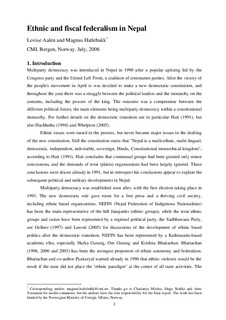| dc.description.abstract | Nepal is in the process of making a democratic federal republic. We hope to contribute to the discussions of ethnic and fiscal federalism based on experiences from other countries. Our main conclusions are: The new constitution should facilitate a deep-rooted and inclusive democracy where all minorities are protected. Irrespective of the final partition, there will be a number of ethnic minorities within all federal states. A thriving and inclusive local democracy is necessary to secure the interests of all local peoples and not only the local elites. Furthermore, the constitution should secure the interests of groups defined along non-ethnic cleavages such as class, caste, urban/rural and religion. To the extent possible each federal state should include an economic center. This is hard to implement given the regional economic structure of Nepal, and a relatively strong national government is necessary to redistribute financial resources to the poorer states in the eastern, and in particular, the western hills, and possibly also the western terai. The national government should also unify the tax- and redistribution system to avoid tax competition and inefficient adjustments to the fiscal system. | |
